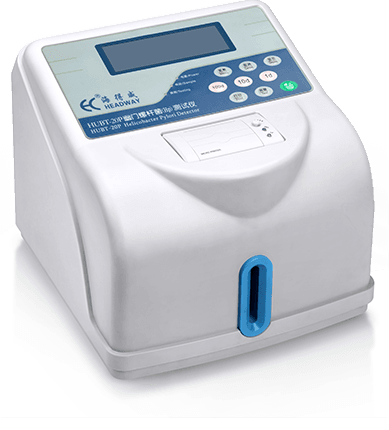If you have a lot of stomach problems including gastritis and ulcers, this bacterium could be the reason why. At Klinik Casabrina, we offer urea breath tests as a reliable, non-invasive diagnostic tool to detect Helicobacter pylori (H. pylori) infections, a common cause of gastrointestinal issues affecting up to 50% of people.
This quick and painless procedure helps pinpoint the root of your symptoms so that you can receive targeted treatment and relief.

An H. pylori test kit is used to detect the presence of Helicobacter pylori bacteria. These kits are convenient and often used in clinical settings or at home under medical guidance.
The test works by detecting carbon dioxide in your breath after ingesting a harmless urea solution. If H. pylori is present, the bacteria break down the urea, releasing carbon dioxide, which is then measured during the test.
Helicobacter pylori (H. pylori) is a type of bacteria that infects the lining of the stomach. It is one of the most common bacterial infections worldwide, affecting nearly half of the global population, though many people may not show symptoms.
H. pylori is spiral-shaped, which helps it burrow into the stomach lining to survive in the highly acidic environment of the stomach. Once established, it can cause inflammation and damage, leading to various gastrointestinal issues.
No needles or invasive procedures are required.
It can detect active H. pylori infections with precision.
The entire process typically takes less than 30 minutes.
The test is suitable for both adults and children.
Your doctor may recommend a urea breath test if you experience symptoms that suggest the presence of H. pylori infection or other gastrointestinal issues. These symptoms may include:
Abdominal pain: Ongoing discomfort or cramping, often centered in the upper stomach area.
Indigestion or heartburn: A burning sensation in the chest or upper abdomen, often after eating.
Bloating and nausea: A feeling of fullness, swelling in the stomach, or queasiness that doesn’t seem to go away.
Burping too much: A sign of digestive discomfort caused by the breakdown of stomach contents or gas production.
Peptic ulcers: These can include burning pain in the stomach, especially on an empty stomach or at nigh.
Vomiting or blood in stool: Severe symptoms indicating advanced ulcers or gastrointestinal bleeding.
Feeling tired: H. pylori infections can sometimes lead to anemia, causing persistent tiredness or weakness.
Bad breath: Halitosis that doesn’t improve with oral care may be linked to H. pylori overgrowth in the stomach.
It’s also recommended to get a urea breath test after H. pylori treatment to confirm the infection has been cleared. Early detection and treatment of H. pylori can prevent further complications, such as chronic gastritis or an increased risk of stomach cancer.
If you’re experiencing any of these symptoms, consult with your doctor to determine whether a urea breath test is appropriate for you.
You’ll exhale into a bag to provide an initial breath sample. Then, you’ll drink a solution containing a small amount of urea labelled with a harmless isotope.
After 15–20 minutes, you’ll exhale into another bag. The samples are analysed to detect carbon dioxide levels. If elevated, it indicates the presence of H. pylori.

To prepare for a urea breath test, fast for 4–6 hours beforehand, avoiding all food and drink except water (and none in the final hour). Stop antibiotics 4 weeks prior, proton pump inhibitors (PPIs) 2 weeks before, and antacids like bismuth for at least 2 weeks, as instructed by your doctor.
Refrain from smoking for 6 hours and alcohol for 24 hours before the test. Avoid irritating foods like spicy or acidic items the day before. Inform your doctor of any medical conditions, medications, or if you’re pregnant or breastfeeding. Follow all specific instructions from your doctor to ensure accurate results.
Yes, the test is completely safe, including for children and pregnant individuals. The urea solution used is non-toxic and harmless.
Yes, you can resume your normal activities immediately after the test.
Yes, H. pylori infections are treated with a combination of antibiotics and medications to reduce stomach acid (such as proton pump inhibitors). Treatment typically lasts 10–14 days.
The urea breath test is highly accurate, with a sensitivity and specificity of over 90%. It is one of the most reliable methods to diagnose active H. pylori infections.
H. pylori spreads through contaminated food, water, or close contact. Good hygiene practices, such as washing hands regularly and eating properly prepared food, can reduce the risk of infection.

Don’t let persistent stomach discomfort go untreated. With our urea breath test services, you can achieve accurate diagnosis and effective treatment for H. pylori infections. Contact Klinik Casabrina today to schedule your test and take the first step toward better gastrointestinal health!
Klinik Casabrina is a women’s and children’s healthcare clinic in Seremban, Malaysia. We provide specialized services such as gynecology check-ups, antenatal and postnatal care, and more.
Copyright © 2023 CASABRINA MEDICAL SDN BHD 202201045614 (1491311-M). All Rights Reserved | HTML Sitemap | Privacy Policy | Created by Hypercharge.